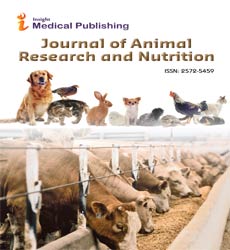Animal Food-Based Dietary Guidelines
Nor Azura*
Department of Animal Science, Universiti Malaysia Perlis, Malaysia
- *Corresponding Author:
- Nor Azura
Department of Animal Science, Universiti Malaysia Perlis, Malaysia
E-mail:azura_n@gmail.com
Received date: January 11, 2023, Manuscript No. IPJARN-23-16006; Editor assigned date: January 13, 2023, PreQC No. IPJARN-23-16006 (PQ); Reviewed date: January 24, 2023, QC No. IPJARN-23-16006; Revised date: February 04, 2023, Manuscript No. IPJARN-23-16006 (R); Published date: February 11, 2023, DOI: 10.36648/2572-5459.8.1.070
Citation: Azura N (2023) Animal Food-Based Dietary Guidelines. J Anim Res Nutr Vol. 8 No1: 070.
Description
The production of human food affects the environment in multiple ways, including its associated resource use that alters global biomass and nutrient cycles, its effects on climate change, and biodiversity loss. Unbalanced diets that are low in fruit and vegetables, and high in red and processed meat are a major risk factor for several non-communicable diseases, such as cardiovascular diseases, stroke, cancer, and diabetes. In high-income countries, shifting consumption towards plant-based diets is often recommended, to decrease environmental impacts of food consumption and to improve human health benefits of diets. This recommendation is due to the generally favourable environmental effects of plant-based food compared with animal products, as well as the increased risk for diet-related diseases in the case of low fruit and vegetable consumption, and high red and processed meat intake.
Food-Based Dietary Guidelines
Food-Based Dietary Guidelines (FBDGs) are key references for healthier food choices. Although environmental concerns are increasingly addressed in FBDGs, for example, in the 2019 EAT–Lancet Commission and in several national FBDGs, most national FBDGs are still primarily driven by health and nutritional criteria and often do not include sustainability aspects. Compared with globally applicable guidelines, such as the EAT Lancet Commission, national FBDGs take geographical and cultural circumstances into consideration, and are often well embedded in education and nutrition counselling at the national level.
Although the necessity to reduce the consumption and production of animal products is generally acknowledged, different solutions exist regarding how animal products could be more sustainably produced, and which animal products should be reduced and to what extent. From a supply perspective, studies suggest that animal production systems should be intensified, which would result in lower environmental impacts per quantity of animal products produced but would require higher concentrate feed inputs given that growth could be faster. From a demand perspective, studies often recommend reducing consumption of animal products substantially or to a minimum. In narratives, land suitability and therefore competition between resources for feed and for food production is mostly not addressed.
Nutritional Supplements
Heat stress will cause a series of response in the living system and the most significant impact is on brain functions. The aim of this article is to develop nutritional supplements that can alleviate cognitive decline caused by heat stress. In this article, we screen functional food factors which can prevent or relieve effects on heat stress injury based on bioinformatics. 129 function factors related to the crossover targets were obtained, and a food database related to the prevention of high-temperature impairment was constructed. After a series of scoring standards combined with food classification, two formulas nutrition fortifier formula (tyrosine and multivitamin B) and plant compound formula (quercetin, proanthocyanidin, and naringin) were investigated using animal experiments to determine their ability to prevent cognitive impairment of heat-stressed animals. Our results demonstrated that certain functional food factors and our two designed formulations significantly prevent cognitive impairment of heat-stressed animals.
Further mechanism was carried out by cell viability assay, reactive oxygen species assay, real-time quantitative PCR and Western blot. The results showed that the plant compound formula diluted 4000 times had the best relieving effect on HT22 after heat stress, and this concentration formula can significantly alleviate the elevated levels of reactive oxygen species caused by heat stress. This formula also can significantly down-regulate expression. Likewise, Western blot results showed that the formula could activate the cAMP pathway and increase the expression of phosphorylated PKA and BDNF in hippocampal cells.
Naturally, when resources are suitable to be allocated for feed and for food production, choices need to be made that have consequences for the sustainability of the food system. In circular food systems, resources are prioritised for human food first, and animal feed is allocated as a second priority. A guiding principle for this type of system is to close nutrient cycles where possible and to minimise external inputs, such as feed and mineral fertiliser imports. Animals would then be fed with primarily domestically available low opportunity cost biomass, which is also known as the concept of ecological leftovers in the literature. Subsequently, feed food competition would be largely avoided and biomass could be used more effectively. Through this process, animals can contribute to recycling biomass and nutrients back into the food system, which would otherwise be lost for human food consumption. Considering that recommendations in national FBDGs for most high-income countries are currently driven by health and nutritional aspects and are based on the current linear food system, the role of animal products in FBDGs from the perspective of the environment and efficient resource use is unexplored.
Energy is important for human survival; as such, it is also a global strategic issue related to the development of society, and the international political and economic context. The international energy outlook 2021 has predicted that global energy demand is expected to increase from 630 quadrillion to 880 quadrillion Btu by 2050. Energy consumption in agricultural production accounts for a large share of the total global energy consumption. With a soaring global population and the reduction of arable land and water resources, modern agriculture is becoming increasingly energy dependent (including fertilisers, electricity and diesel); as such, it has become a major global pollution source. Food safety is a growing concern in many countries due to residual chemicals, antibiotics, and hormones. Over the past five years, the number of people facing severe food insecurity is at its highest highlighting the need for urgent solutions.

Open Access Journals
- Aquaculture & Veterinary Science
- Chemistry & Chemical Sciences
- Clinical Sciences
- Engineering
- General Science
- Genetics & Molecular Biology
- Health Care & Nursing
- Immunology & Microbiology
- Materials Science
- Mathematics & Physics
- Medical Sciences
- Neurology & Psychiatry
- Oncology & Cancer Science
- Pharmaceutical Sciences
